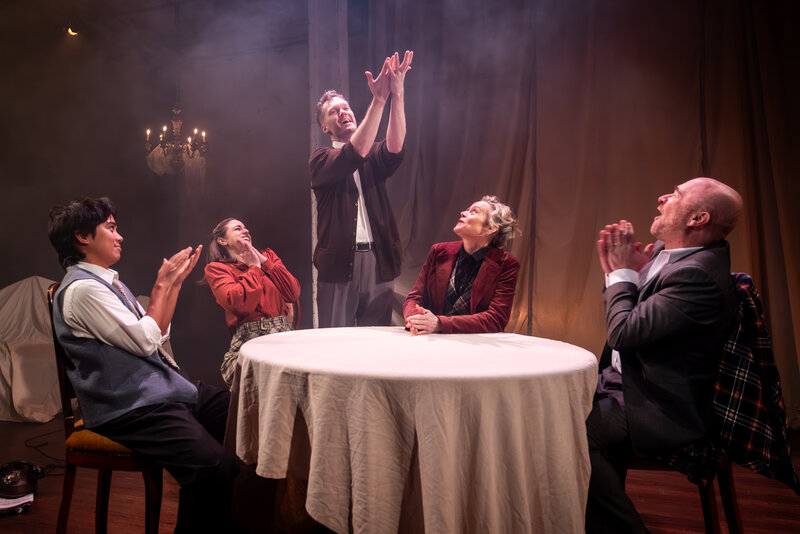 In this unique artistic venture, author and musician Colin MacIntyre, who records music under the moniker of the Mull Historical Society, seeks to bring together the two artistic worlds of his creative life. As an author, MacIntyre’s debut novel, The Letters of Ivor Punch appeared in 2015, and his 4th book, When the Needle Drops, a crime novel set on the Isle of Mull off the coast of Scotland, will come out this September. On this 7th album using the Mull Historical Society, with two additional releases under his own name, MacIntyre has invited thirteen of his literary peers to contribute stories about a “special room that plays or has played a significant part in their lives.” MacIntyre then took the words they shared with him, and adapted them into the lyrics, writing original music, a method he describes as imitative of Elton John shaping the writings of his artistic partner Bernie Taupin into rhythm and melody, relying on some of the UK’s leading musicians to bring these compositions to life in the studio. In an unexpected turn of events, MacIntyre ended up recording these tracks in a studio located in the very same apartment his grandfather, Angus MacIntyre, had lived in, above the bank of Tobermory, on Mull, one more way that MacIntyre’s life and interests have come together in this long, 14 track project.
In this unique artistic venture, author and musician Colin MacIntyre, who records music under the moniker of the Mull Historical Society, seeks to bring together the two artistic worlds of his creative life. As an author, MacIntyre’s debut novel, The Letters of Ivor Punch appeared in 2015, and his 4th book, When the Needle Drops, a crime novel set on the Isle of Mull off the coast of Scotland, will come out this September. On this 7th album using the Mull Historical Society, with two additional releases under his own name, MacIntyre has invited thirteen of his literary peers to contribute stories about a “special room that plays or has played a significant part in their lives.” MacIntyre then took the words they shared with him, and adapted them into the lyrics, writing original music, a method he describes as imitative of Elton John shaping the writings of his artistic partner Bernie Taupin into rhythm and melody, relying on some of the UK’s leading musicians to bring these compositions to life in the studio. In an unexpected turn of events, MacIntyre ended up recording these tracks in a studio located in the very same apartment his grandfather, Angus MacIntyre, had lived in, above the bank of Tobermory, on Mull, one more way that MacIntyre’s life and interests have come together in this long, 14 track project.
Given the lofty, literary ambitions of In My Mind There’s a Room, you might expect works like “Anglypta,” and “Memories of Mull,” written by Colin MacIntyre’s grandfather Angus, which close out the album to dominate, where the musical settings are mere musical backing for a dramatic reading of the author’s words. But as interesting as that can be, thankfully most of the songs here aspire to a more thoroughgoing contemporary pop and rock compositional mix. In the opening track, “Not Enough Sorry,” MacIntyre builds a piano pop song around Jennifer Clement’s prose, using repeated phrases to build musical tension, that serves the melody well. In “1952,” he builds on a stuttering guitar riff, to hang Liz Lochhead’s story on a fun vocal hook that blends the year in question with a reference to “Virginia Woolf.” It’s an alternative pop rock grove, curiously enough inspired by the same author that contributed “Anglypta.” For “Kelshabeg,” a story by Sebastian Barry, MacIntyre mixes musical references, developing a pop song at the front end, evolving into a bit of opera at the midpoint, then a bit of calliope polka, before blending all the bits together at the end.
Some authors obviously spark MacIntyre more edgy rock side, like Nick Hornby, who gave us “High Fidelity” and “Fever Pitch.” For his contribution, “Panicked Feathers,” MacIntyre channels his punky Frank Turner side, finding a fun, fast, melodic rant groove that serves up the story with energy. Similarly for Ian Rankin’s “My Bedroom Was My Rocket,” channels a bit of David Bowie in the catchy pop/rock chorus, while the darker turn of the lyrics in Alan Warner’s “Wake Up Sally” don’t keep MacIntyre from building an edgier pop melody out of the colorful language, keeping it fun and raw. And for “Room of Masks,” by Val McDermid, MacIntyre returns to repetitive lines to serve his larger pop song melodic goal.
But not every piece of writing is going to easily lend itself to verse-chorus song structures, so numerous pieces line out like longer narrative, with MacIntyre’s simple piano and vocals shaping melodies as they go, without the benefit of easy rhymes or repeats. “The Red Flame Diner” is one that stretches out in a linear fashion, with smart musical augmentation that provides the needed aural tension to the piece. When the obvious techniques don’t cooperate, leaving MacIntyre to be inventive on pieces like “Meltwater” and “Somebody Else’s Life,” he seems to vamp the vocal melody over a simple musical frame. And when push comes to shove, MacIntyre is not afraid to pull out the opening to a classic rock song as an intro, even if it doesn’t fit the rest of the track, as he does with “Seeds,” for a story by James Robertson.
Colin MacIntyre and his Mull Historical cronies get lots of points for the creative, experimental nature of this work, sure to stir up interest on the curious readers among us. And there’s enough fun pop and rock here to reward even the more informal listener. This smart, innovative, and literally literate work aspires to inform, enlighten and inspire, and manages to succeed at every point.
Brian Q. Newcomb
For more of Brian Q. Newcomb’s music reviews, check out The Fire Note
Other reviews you might enjoy:
- A Black Mile to the Surface by Manchester Orchestra – music review
- As It Ever Was, So It Will Be (The Decemberists) – music review
- Partly Cloudy (Catbells) – music review

The Fire Note started to create a simple place that could showcase records that we liked. Nothing more, nothing less. The focus has always been about the album and the experience that a great record creates. The Fire Note Webzine builds on this idea by offering an array of content that is all about the enjoyment of music, its pulse and energizing attitude.





